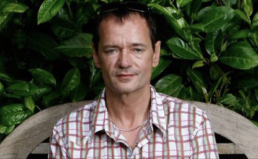These life stories may contain descriptions of childhood trauma and abuse, as well as images, voices and names of people now deceased. If you need help, you can find contact details for some relevant support services on our support page.
Screenwriter, Paul Abbott (b. 1960), was in foster care as a teenager.
Paul was born into a large family, the seventh of eight children. The family lived in a council house in Burnley, England. The siblings were devastated when Paul’s mother abandoned the family to live with another man when Paul was nine years old. He describes his family home as highly dysfunctional, but somehow unnoticed by child protection authorities.
When Paul’s father also left a few years later, the children were grateful. His sixteen-year-old sister was left to look after her younger siblings. Paul and his siblings rarely attended school because they needed to earn money to survive. Paul started his newspaper delivery route at four am each morning to escape the chaos of his family.
Everything you did was in the imperative: we have got to get money (Jeffries).
Paul is very candid about his struggle with bi-bolar disorder. At the age of eleven, he was raped by a stranger. This led him to attempt suicide by jumping off the roof of a multi-story car park. Paul attempted suicide again at age fifteen, after which he was sectioned in a psychiatric ward. He then entered foster care, which was a positive experience for him.
Paul learned how to type using a typewriter while in foster care. He joined a local writing group and began writing for magazines at the age of sixteen. Paul continued to write for magazines while at university. At age twenty-three, he sold his first radio play to the BBC with the help of Alan Bennett.
I didn’t know him but I got his address and just said ‘Look, I need to get a professional sponsor… would you read the script?’. He read it and sent it back and wrote ‘although it wasn’t a masterpiece, it certainly deserved his name’ (Gilbert).
Paul went on to become a highly successful screenwriter. He was the youngest ever writer on Coronation Street. Sam and Cracker. Paul worked on the crime drama, Cracker, before eventually writing his own police drama-comedy, No Offence.
Paul won his first Bafta Award for his series about factory workers called Clocking Off. His next show, State of Play, was a six-part series about a newspaper investigation into the death of a political researcher. The 2003 show attracted a new, middle-class audience and won him further Bafta awards. In 2009, it was re-made as a film starring Ben Affleck and Russell Crowe.
Paul Abbott’s most successful TV series is the critically-acclaimed drama, Shameless. The series chronicles the lives of the Gallaghers. The family of eight children live in an overcrowded house in Burnley with their reckless alcoholic father, Frank Gallagher. The show is largely based on his own life and ran for eleven seasons between 2004 and 2013.
Paul is a passionate writer who is constantly coming up with new ideas. He credits writing with saving his life.
“You know, people have often asked me what would I have done if I had not become Paul Abbott, writer.” He bursts out laughing again. “It’s an impossible question but I probably wouldn’t be here!” (White).
Paul’s most recent series, Wolfe, is a “funny forensics show” about the life of crime-scene investigator, Professor Wolfe Kinteh. The character is inspired by Paul’s own lived experience of mental health issues.
I’m bipolar and Wolfe’s manic episodes are like mine. His glee when he’s bending the rules or solving a case is just like me when I’m on one, when I start writing at 5.30am then come out at 1.30am with 16 pages (Jeffries).
Paul has three children and has been married four times. His oldest child, Tom, is a police officer. Tom and Abbott’s oldest daughter, Annie, were born to his third wife Saskia. Paul Abbott and his fourth wife, Larkin, have a daughter named Ellis who is twenty-two years younger than her older sister. The couple met in Venice Beach, California while Paul was recovering from a mental breakdown. The family divide their time between homes in Manchester, London, Los Angeles, and France.
I love parenthood. It’s great. The unconditional part of it is the glory. Even the observational side of it, every single day there is something amazing (White).
References:
Carts, Benny. “Amazing British TV Shows You Probably Haven’t Seen.” Medium, 6 May 2022. https://medium.com/illumination/5-amazing-british-tv-shows-you-probably-havent-seen-c66598d3b83f
Gilbert, Gerard. “Paul Abbott on ‘No Offence’, ‘Shameless’, and a life too grim for television.” Independent, 28 April 2015. https://www.independent.co.uk/arts-entertainment/tv/features/paul-abbott-on-no-offence-shameless-and-a-life-too-grim-for-television-10207749.html
Jeffries, Stuart. “Paul Abbott: ‘I have written two scenes I can’t bear to watch’.” The Guardian, 23 August 2021. https://www.theguardian.com/tv-and-radio/2021/aug/23/paul-abbott-shameless-wolfe-shameless-wolfe-babou-ceesay-sky
Midgley, Carol. “Paul Abbott on creating Shameless and his horrific childhood.” The Times, 13 August 2011. https://www.thetimes.co.uk/article/paul-abbott-on-creating-shameless-and-his-horrific-childhood-b9kpprklzrj
White, Francine. “Kitchen sink drama.” Big Issue North, 11 Dec 2016. https://www.bigissuenorth.com/features/2016/12/kitchen-sink-drama/#close
Image available here.
